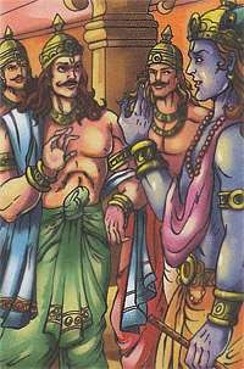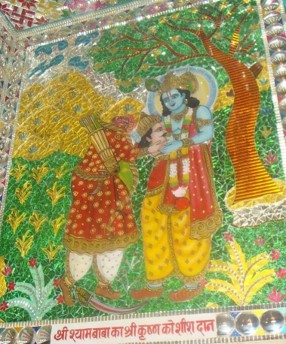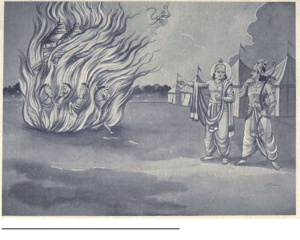Talk:Nimitta-Mātra: Becomes an Instrument of Bhagavān in the True Sense
By Vishal Agarwal
In the Gita, Krishna states that he is immanent in all creatures and is their inner controller-
Krishna said: Arjuna, the Īshvara dwells within the region of the heart of all beings, causing them all beings to revolve by Māyā, as if mounted on a machine. Gita 18.61
The Bhakti Yogī is free of the ego that ‘I am the doer’ because he understands that true agency is with the Īshvara-
One must never boast that “I am the doer” because only the Īshvara is always the Doer. Skanda Purāṇa, Kailāsha Khaṇda 57.283
Our Gurus therefore exhort that the Bhakti Yogī should develop the Nimitta Bhāva in all his actions. This attitude is explained by Swami Sivananda eloquently in the following words-
“…The Bhakta develops the Nimitta Bhāva and makes a complete self-surrender at the lotus feet of the Īshvara. God alone is. God alone acts. Even a piece of straw cannot move without His Will. He is the doer. He alone is the enjoyer. I am but an instrument in His hands. He is the power that resides in the senses and the mind. The power of seeing, of hearing, and talking all belong to Him. He utilizes my mind and the senses and works out His Will. My body, mind, senses, and all else belong to Him alone. This is the Nimitta Bhāva….[1]”
“Bhakti yog is a method to kill the sense of separateness of egoism. It annihilates the modifications of the mind and fills the individual with universal consciousness. A bhakta says: “O Īshvara! I am Thine. All is Thine. I am not a separate entity. I have no power to do anything. You are doing everything, taking yourself as an instrument. O Īshvara! You are everywhere, I cannot even move, for You are everywhere. I am walking over Your Body. I am not able to live separately for I am seeing You everywhere. You appear as the man and the woman and as the old man who totters with a stick on the road. You have become everything. I have no independence. I am Your slave. A slave has no optional views. He can do only what the Master commands him to do. I am doing nothing. You only are doing it through me. You are the Doer. You are the Enjoyer. I am nothing. Thy will be done.[2]””
Story: Barbarīka, the Grandson of Bhīma
At the beginning of the Mahabharata war, Barbarīka, the grandson of Bhīma and the son of Ghaṭotkacha resolved to fight for whichever of the two warring sides was the weaker side. Due to the smaller size of the Pāṇdava army, he would have joined his father and grandfather. But being a brave warrior, he would have slain many on the opposing side of Kaurava-s, rendering them weaker than the Pāṇdava-s. It was feared that he would have then switched sides, till the latter were weaker again. Krishna was worried that this could cause the potential slaughter of the five Pāṇdava brothers themselves at the hands of their grandson and therefore promptly beheaded Barbarīka. But, he blessed Barbarīka’s head with immortality and placed it at the top of a tree[3] from where he could watch the entire war being fought.
Krishna. It is Krishna alone who caused several deaths, and who saved all the survivors.[4]”
Krishna as the Savior of the Pāṇdavas
According to the rules of the war, the Pāṇdavas and Krishna went to the tents of the Kaurava army to spend the night there and take possession of the Kaurava treasury. This meant to show the world that the Pāṇdavas now faced no danger from the Kaurava army and could even sleep without any fear in the Kaurava camp.
When the chariot of Arjuna reached the Kaurava camp, Krishna asked Arjuna to take his bow and other weapons, get off the chariot and walk away to some distance. When Arjuna did this, Hanuman immediately flew off from the flag of the chariot and disappeared. Then, Krishna got off and walked towards Arjuna. Immediately, the chariot burst into flames and exploded as the Pāṇdavas looked in shock! Yudhishthira asked Krishna as to why this happened. Krishna explained, “During the war, the chariot had been hit by many missiles and it should have exploded several days ago. But my presence kept it intact. Now the war is over, and we do not need it anymore. Therefore, I have allowed it to get destroyed.” Yudhishthira then bowed to Krishna with respect and said, “We owe our victory to you Krishna. If you had not been there to look after us, we would have lost our lives a long time ago.”
References[edit]
- ↑ Sivananda, Swami. Triple Yog. 6th ed., The Divine-Life Society, 1999, p. 105. Tehri-Garhwal, Uttarakhand, India.
- ↑ Sivananda, Swami. Bhakti Yog. The Divine-Life Society, 1986, pp. 2–3. Shivanandanagar, District Tehri-Garhwal, Uttarakhand, India.
- ↑ Or, on a hill or a pillar in some versions. In other versions, Barbarīka beheaded himself and gave his head to Krishna. The site is marked by the Khatu Shyam temple in the Sikar district of Rajasthan.
- ↑ Skanda Purāṇa, Māheshvarakhaṇda, Kumārikākhaṇda chapters 61-62 contain the story till the beheading of Barbarīka. Chapter numbers can vary in some editions.



